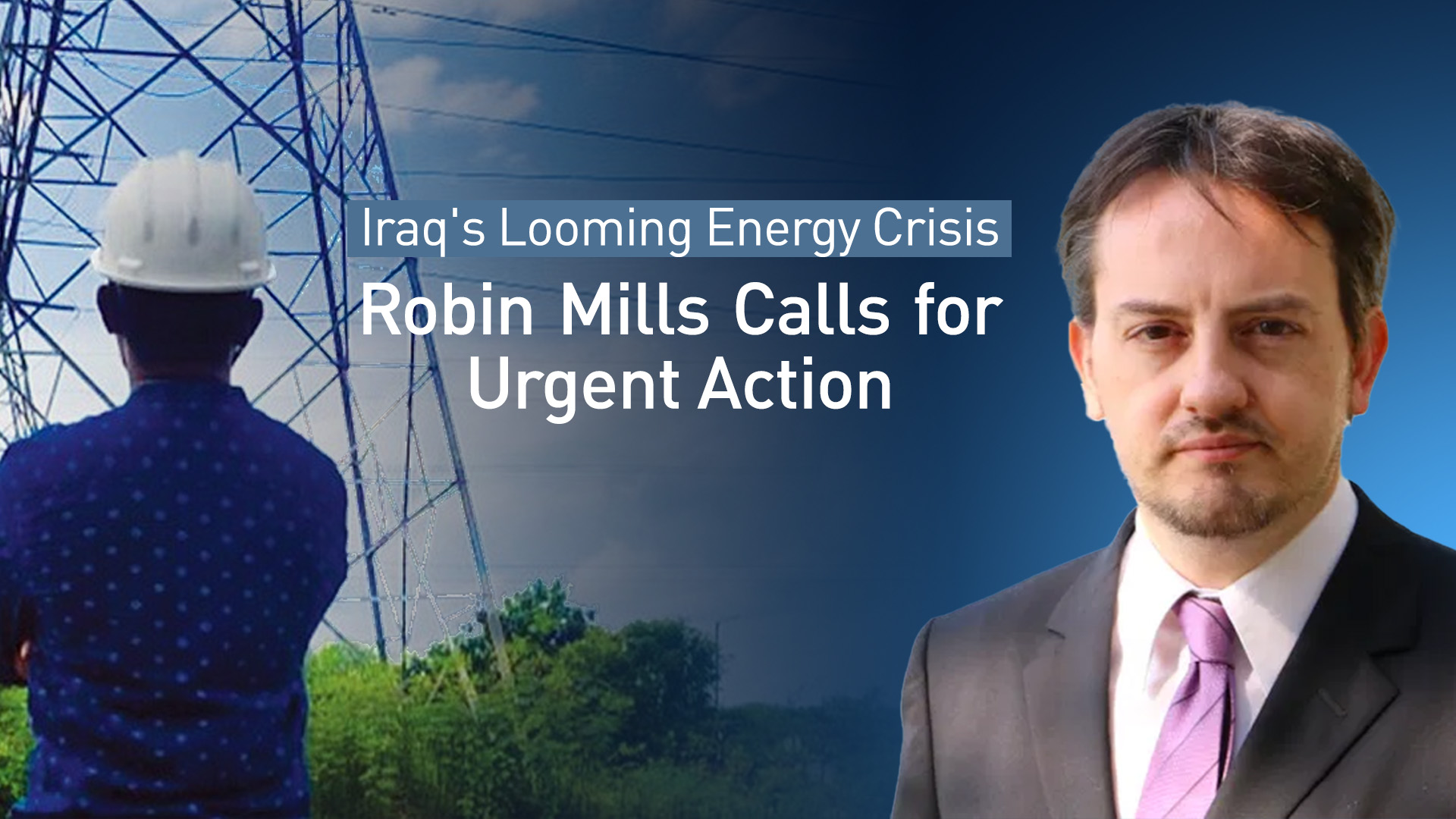Iraq's Looming Energy Crisis: Robin Mills Calls for Urgent Action
The Kurdistan Region has untapped potential to contribute to Iraq’s energy security: "If developed properly, its gas fields could not only meet its own needs but also supply federal Iraq, easing the overall energy crunch."

ERBIL (Kurdistan24) – Iraq is at a critical juncture, experiencing economic growth and improved security, yet facing an escalating energy crisis that demands urgent attention. According to Robin M. Mills, CEO of Qamar Energy and author of The Myth of the Oil Crisis, Baghdad must act swiftly, with the Gulf Cooperation Council (GCC) emerging as a key potential partner in resolving its electricity woes.
The Growing Electricity Crisis
Despite positive economic indicators, Iraq has long struggled with severe electricity shortages. The country’s peak power demand surged to 48 gigawatts (GW) last summer, far exceeding its best-case generation capacity of 27GW. Decades of underinvestment, rapid urbanization, and inefficient pricing have exacerbated the crisis, leading to daily blackouts, reliance on costly diesel generators, and stunted economic growth.
"Even this winter, when power supplies are typically more stable, Iraqis have endured blackouts lasting up to seven hours a day," Mills notes. "The coming summer will only intensify these challenges."
Reliance on Iran: A Fragile Solution
For years, Iraq has depended heavily on Iran for electricity and gas imports. Since 2017, Baghdad has sourced gas from Tehran, signing a renewed contract last March for 50 million cubic meters daily. Additionally, Iran directly supplies Iraq with 1GW of electricity. This arrangement costs Iraq roughly $4 billion annually.
However, as Mills warns, Iran’s ability to reliably meet Iraq’s energy needs is waning. "Tehran is facing its own growing energy shortfalls, caused by soaring domestic demand, heatwaves, droughts affecting hydroelectric production, and chronic underinvestment in gas fields," he explains.
Political factors further complicate the situation. The U.S. has historically issued short-term waivers allowing Iraq to import Iranian electricity, but the Trump administration sought to revoke these waivers as part of its "maximum pressure" campaign. Mills cautions that continued U.S. pressure on Iran could leave Iraq in an even more precarious position.
Seeking Alternatives: Iraq’s Limited Options
Iraq has attempted to diversify its energy sources by establishing power connections with Turkey and Jordan and purchasing electricity from the Kurdistan Region. In October, Baghdad also secured a gas import deal with Turkmenistan. However, Mills highlights a major issue: "This gas must transit through Iran, making it vulnerable to U.S. sanctions. Even if fully realized, it would only generate around 3,000-4,000MW, leaving a substantial shortfall."
Additionally, Iraq is planning a liquefied natural gas (LNG) import terminal at Faw, near Basra. Progress has also been made in capturing flared gas from oil operations, with major projects led by Shell, Total Energies, and Crescent Petroleum. However, these solutions remain insufficient to address the country’s immediate crisis.
The GCC’s Role: A Strategic Partnership
With Iraq at an energy crossroads, Mills argues that the GCC has a vested interest in supporting Baghdad. "A stable and economically prosperous Iraq is crucial for the region," he states. "Yet, the Gulf countries have historically had limited political influence in Baghdad, where pro-Iranian factions dominate."
Several Gulf nations have engaged in energy collaborations with Iraq:
A: Qatar Energy is partnering with Total Energies on a gas capture project.
B: The long-delayed GCC electricity grid connection via Kuwait is finally set for completion this year, adding 500MW of capacity.
C: Saudi Arabia’s Acwa Power, along with UAE-based Masdar and Amea Power, is working to expand Iraq’s solar energy capacity.
Mills envisions an even broader strategy. "The GCC should significantly expand its electricity transfer capacity, forming the foundation of a pan-regional grid that includes Jordan, Egypt, and Turkey," he suggests. "Large-scale solar farms in Iraq could also be fast-tracked, with gigawatt-scale projects replicating those in the GCC."
Overcoming Bureaucratic Hurdles
Iraqi bureaucracy has slowed progress on energy projects, but Mills believes that a renewed push—supported by the U.S.—could make a real difference. "By working with provincial authorities on smaller local energy projects, Gulf countries could build goodwill and experience," he explains. "Additionally, partnering with U.S. firms to modernize Iraq’s power grid could help reduce the staggering 40-50% of electricity lost to inefficiencies and illegal connections."
Kurdistan’s Role in Iraq’s Energy Future
The Kurdistan Region also has untapped potential to contribute to Iraq’s energy security. Mills points to the ongoing expansion of the Khor Mor gas field by Crescent Petroleum and Dana Gas as a positive step. "If developed properly, the Kurdistan Region’s gas fields could not only meet its own needs but also supply federal Iraq, easing the overall energy crunch," he suggests.
A Critical Summer Ahead
With Iraq’s energy crisis set to worsen in the coming months, Mills issues a stark warning: "It’s going to be a hot and restless summer. The ongoing U.S. pressure on Iran means that many countries in the region will feel the squeeze. This could either trigger further regional instability—or present an opportunity for a constructive, long-term energy partnership between Iraq, the GCC, and the wider Middle East."
As Iraq stands at this crossroads, its next steps will determine whether it plunges deeper into an energy crisis or secures a more stable and prosperous future. The choice, Mills argues, is clear—but time is running out.